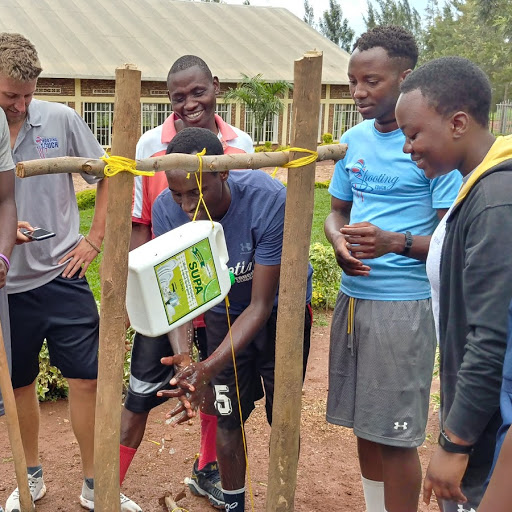Program Description:
The cornerstone of the Rwanda program is our custom-developed “Turikumwe" (which in Kinyarwanda means “We are Together”) Health Curriculum. This sense of togetherness when teaching and learning this 8-unit curriculum signifies the bond and responsibility players have with their teammates and coaches on and off the court. Turikumwe encompasses the belief that when we work together as one, we can overcome the heavy burdens of gender inequality and lack of proper health knowledge/action and we can ultimately choose the right path of our own future.
In order to create sustainable, individual health change and break unhealthy community norms and stereotypes, the “Turikumwe Health Curriculum” focuses on issues relevant and problematic to our participants. Each unit is taught for three months, and four units are taught annually to all boys, girls, and women. Prior to, and following the three months of educational sessions, oral exams are distributed to measure retention of information. Each unit of health education marries the two concepts of basketball skill and health knowledge, and are taught before, during or after practices.
program goals:
Provide access to health education
Participants have increased knowledge on health issues relevant to their lives
Participants have positive attitudes and behavioral changes towards health issues
Program Outcomes:
Health Education Test Scores
By the Numbers:
95% of our women and girls now feel more comfortable saying “NO” to sexual coercion compared to only 34% prior to our Sexual Health I Unit.
51% of our participants reported that they got tested for HIV for the first time ever following our HIV Unit this past year (2019).
89% of boys now feel comfortable with the changes experienced during puberty in comparison to the 44% prior to our Sexual Health II Unit.
1,090 families have access to clean water through distribution of Sur Eau purification solution following our Hydration Unit.
78% of women, 77% of girls, and 85% of boys reported experiencing positive relationship changes after learning our Sexual Health II Unit.
90% of our participants make a conscious effort to wash their hands throughout the day following our W.A.S.H Unit.
100% of the women in our program have been screened for lumps in their breasts and have been taught how to check for lumps themselves.
100% of our boys agree that females deserve equal opportunity to participate in sport.
100% of participants have increased knowledge of all Rwanda health issues covered in the Turikumwe Health Curriculum.
Non Communicable Disease:
NCDs lead to more deaths globally than all other causes combined and combating them is a major focus in Rwanda. In this health unit, we focus on education of Cardiovascular Disease, Cancer, Chronic Respiratory Illness, Mental Illness, and Diabetes. Alongside of the education, we have worked with local partners to allow our participants to access services. ST has provided the following services:
Upper Respiratory Disease Screening
Preliminary Breast Cancer Screening For Possible Lumps
Blood Glucose Testing
Blood Pressure Testing
Visual representation of smoke residue from cooking indoors with no window verse with proper ventilation.
“I used to bring my baby on my back in the kitchen, but now I stopped. I have been showing people in the community how bad my plate is and telling them ‘look’! I go out and teach others about it.”
Breast Cancer Initiative East Africa:
The World Health Organization (WHO) estimates that 70% of all cancer deaths occur in low and middle in-come countries where resources for prevention, diagnosis and treatment are limited or nonexistent. Lack of awareness, fear, myths, stigma and misinformation are associated with the prevalent late stage presentations of breast cancer by many African women. Advanced breast cancer is costly, difficult or sometimes impossible to treat and may result in death.
Breast Cancer Initiative East Africa (BCIEA) Inc., was created to take the lead in the advancement of breast cancer surveillance and improved survival rates targeting the most neglected low-income communities of East Africa.
ST is working with BCIEA to ensure that the women in our program know how to check for lumps, are screened for lumps, and follow up with local health centers if lumps are found.
Malaria Prevention:
Shooting Touch has been teaching our participants preventative methods of contracting malaria and have even been visiting homes to determine whether our participants are following through with the education. As you see in the chart below, 75% of our participants have reported contracting malaria within the past year and about half have tears in their mosquito nets.
In addition to the education, we have supplied 325 people with bed nets sprayed with insecticide, which are effective for up to 3 years. Our goal is to make sure that all of our participants are protected. To donate to this cause, click here.
“I didn’t even know about malaria. After I attended the lessons at practice, I understood the disease is caused by mosquitoes. I learned my family should close windows and doors before nighttime and that we should always put the bed nets on our bed so the mosquitoes can’t hide inside before it’s time to sleep. I also found out about personal hygiene and how I should always wash my clothing and take baths. I’m always asking questions during the lessons.”
Recent findings from malaria surveys
“I used to mock people with a mental illness. I didn’t understand them, and I can admit, I was afraid of that difference. I’ve learned to have empathy for those with mental illness. Instead of mocking them like the others, I can comfort them and take them to the hospital if necessary.”






